#dr maru
Explore tagged Tumblr posts
Text
Intern Ami has some gifts to give!

Gifts under the cut!
For Dr. Maru! ( @lilysmiles11223345 )

For Dr. Birde! ( @herosplatling-replica )
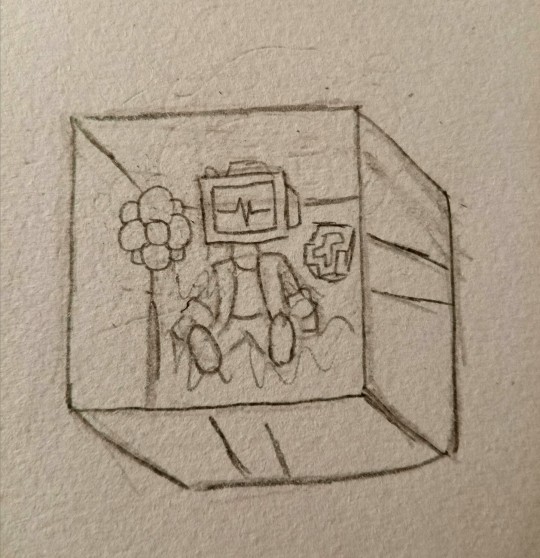
For Dr. Cami! ( @pageofthemicocee )

And for Intern Mish! ( @m3llowm1sh )
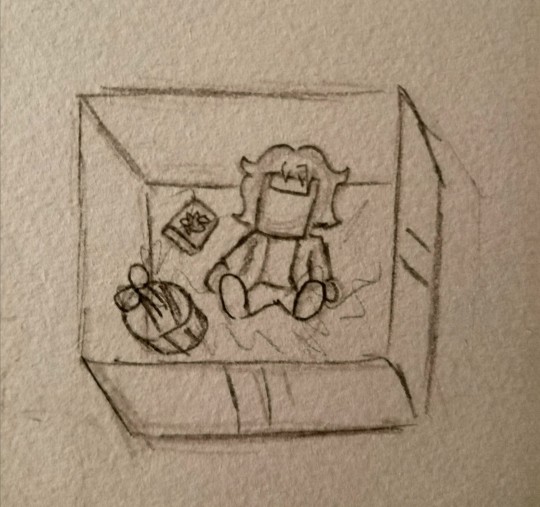
A bit late for Valentines, but I truly wanted to do something for my beloved moots, you have no idea how happy I am to be able to live in the same world as you guys <3
#yay i did a thing#traditional art#rdverse#oc artwork#rhythm doctor#intern ami#dr maru#jay birde#dr cami#intern mish#i love yall <3/p#yall are absolutely amazing#i dont exactly know who is a doctor and whos an intern but as far as I know mish is an intern and the rest are doctors#do correct me if im wrong!#comic#rhythm doctor oc
14 notes
·
View notes
Text
SANRIO x KIM POSSIBLE
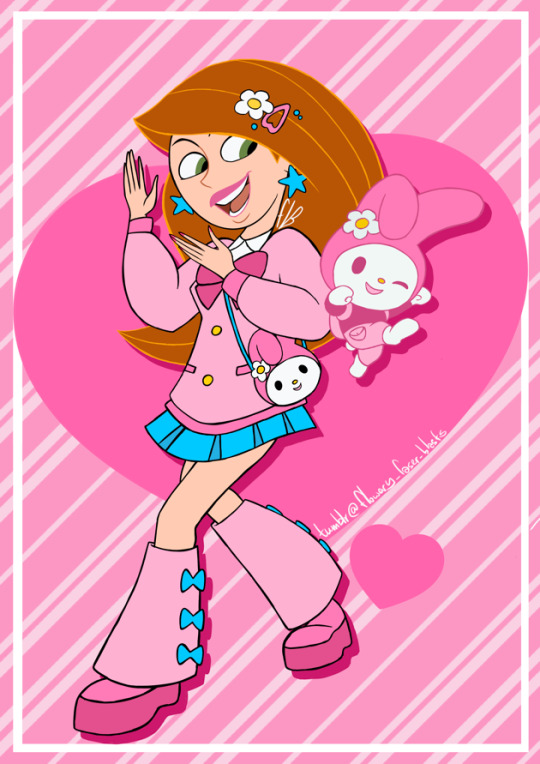


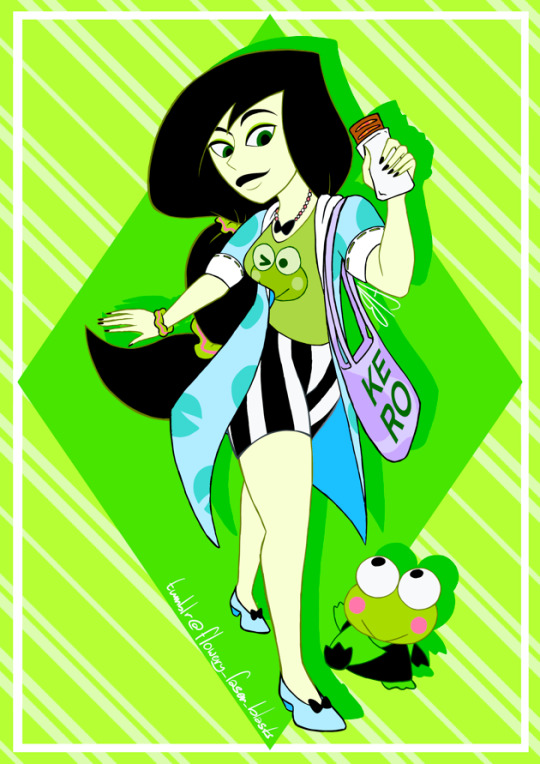
Aaaaa I've had this idea in my head for almost a year I think?! And I finally finished it!! I hope y'all like these combos. I was hesitating with Shego because I personally love Kuromi with her attitude, but I thought KeroKeroKeroppi deserves this team up!
#sanrio#my melody#kim possible#pompompurin#ron stoppable#badtz maru#Dr Drakken#Keroppi#Shego#kerokerokeroppi#drdrakken#drakken#kimpossible#drakgo#kimron#gudetama
447 notes
·
View notes
Text
let's hear it for america's suitehearts!!! 🎠🎪⭐️
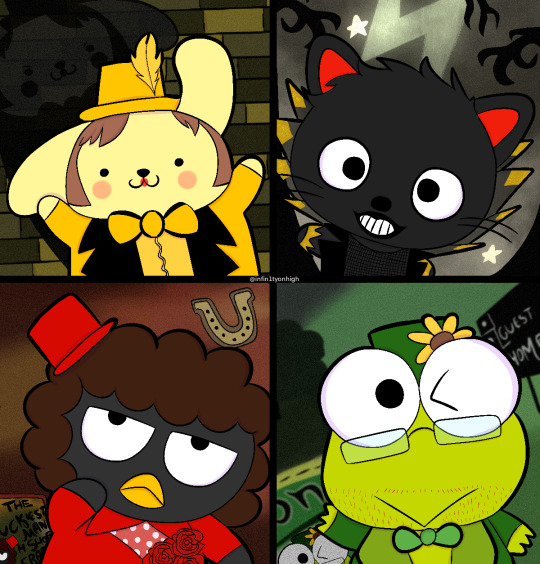
#fall out boy#fob#patrick stump#pete wentz#andy hurley#joe trohman#fall out boy fan art#fob fanart#hello kitty#hello kitty and friends#pompompurin#chococat#badtz maru#keroppi#americas suitehearts#dr benzedrine#mr sandman#horseshoe crab#donnie the catcher#fall out boy fanart
388 notes
·
View notes
Text
So every year or two, I go through a period of reconnecting with my high school Trekkie interests, rewatching some Star Trek clips, episodes, and movies, and during this particular period, I have to voice my main criticism of the reboot films: namely, the treatment of the Enterprise.
To be clear, I think the reboot Enterprise had a nice redesign. She looked very clean and futuristic while capturing the original design in broad strokes. The lens glare is certainly annoying, and it doesn’t have the same heart and retro feel as the original, but I feel they generally did a fairly decent job with the design. I’m talking about how she is treated throughout the films, namely, how she’s treated effectively like just another ship.
In the original series, the Enterprise has a certain heart coming across almost like a character in of herself. You get a clear feel from the characters that they consider the enterprise almost to be home, and Kirk and Scotty in particular see her almost like an actual woman, one who they cherish and will protect at all costs. This sentiment is magnified in the first three movies, particularly in the motion picture and in the search for Spock. When Kirk first sees the refit Enterprise, you can see how much he loves the ship, and when the Enterprise is plunging to her final resting place, the mourning on all of their faces, especially Kirk, makes this moment particularly powerful and truly hammer home that the Enterprise was a character in and of herself. The original Enterprise felt like a character fans had grown up with, and her destruction felt almost like the loss of an old friend. And at the end of the voyage home, when the crew has that last-minute surprise reveal of the Enterprise-A, the triumph and homecoming feeling is so clear that even the audience shares the sentiment, almost as if the character has been reborn.
The enterprise in the reboots was never portrayed this way. She was treated like just a ship, one that might’ve been nicer and fancier and more advanced than the others, but not really all that special beyond that. In the first movie, that’s acceptable, as the focus is on bringing together the crew and getting them where they need to be for the start of their journeys. The second one focuses more on the captaincy, and what it means to really earn that seat, so it’s excusable that this one focused more on Kirk and how seriously he took his responsibilities, though they could’ve put more emphasis on the ship as part of that arc. Yes, the ship almost crashing was an emotional scene, but that had everything to do with the characters aboard and nothing to do with the ship beyond it being the place where the characters were and it’s damage being the reason that they were about to die.
And then in the third one, they just blow up the ship in the first 30 minutes and try to portray it with the same sentimental weight as the destruction of the Enterprise in the search for Spock. Which would’ve been fine, if it weren’t for the fact that they spent the last two movies treating the enterprise like just a thing, just another tool in the characters belt. She had no heart, no soul, no feeling that she was a home, or that she was the thing that brought the crew together, and kept them together, the thing that made them a family. She was basically just a big car, there to get them from point A to point B and occasionally shoot at some bad guys, and then, we’re supposed to feel devastated when she goes down for the final time.
The reveal of a reboot version of the Enterprise A was a nice surprise, but it lacked the emotional payoff of the original version, largely because of how ordinary the first Enterprise had been in this timeline. You can’t really celebrate the revival of a lost character when the character was never really there to begin with. They might as well have put the crew on an entirely new ship, like maybe a rebooted version of the Excelsior, and it would’ve had the same basic impact.
My point is that classic trek, as well as the next generation and DS9, did an excellent job of portraying the dynamic between captain and ship to the point where the ship felt almost like a real character. And that worked really well. It made the crash of the Enterprise D in generations a shocking scene, and it made her surprise return in season 3 of Picard a heartfelt and deeply nostalgic scene (Even if I wanted the Enterprise E, sorry but she’s my favorite). It made the loss of the Defiant in season seven of DS9 a powerful and emotional moment. I haven’t watched a lot of Voyager, so I can’t comment on that, but I can say with decent confidence that they couldn’t have done worse than they did in the reboots.
#star trek#star trek the original series#star trek the next generation#star trek reboot#star trek ds9#ds9#deep space nine#star trek into darkness#star trek beyond#uss enterprise#ncc 1701#enterprise a#enterprise d#enterprise e#james t kirk#mr spock#dr mccoy#tos scotty#mr scott#star trek the motion picture#star trek ii: the wrath of khan#star trek iii: the search for spock#star trek iv: the voyage home#star trek picard#star trek generations#jean luc picard#kobayashi maru#uss defiant#uss voyager
33 notes
·
View notes
Text
Glasses Swag Sequel Preliminary Round #18
Only one will make it into the bracket!
#frank reynolds#it's always sunny in philadelphia#iasip#newton geiszler#pacific rim#masumi ageo#crayon shin chan#eustace misericorde#misericorde#neji kokuto#jack jeanne#keithgrif hazeldine#atelier ayesha#michio hazama#the idolmaster sidem#arale norimaki#dr slump#maru stardew valley#harvey stardew valley#stardew valley#aoi akane#toilet bound hanako kun#tbhk#glasses swag sequel#preliminary round#tournament poll
62 notes
·
View notes
Text

Stardew Valley Inktober day 13: Meadow
I decided to redraw the outfits from the flower dance to actually fit the characters wearing them. This ended up taking like a week by mistake bc I bit off more than I could chew, and even at the terrible quality anything i draw on my cell phone turns out this is still getting blurred by tumblr, so, individual detail pictures below:






I did not spend long detailing Sam’s tattoos because given how far they are from the city, I’m certain they’d be from him and Seb playing around with stick and pokes (disclaimer: do not try this at home). Man definitely has a homemade Wumbus tat.
Ever since I drew Sebastian in the hottopic jncos I have not been able to stop thinking about him being a utilikilt guy
Both frozen tears and Abi’s bow matched the original colour scheme by happy coincidence
I refuse to draw Harvey and Maru any closer than this, that is her BOSS who is at LEAST twice her age. I can see Harvey and Lewis getting into arguments over this.
Shane would show up in his joja sweater that already matched and one of those tee shirts with a tux printed on it and nothing more formal
Emily would 100% make her own dress and embroider all of the flowers by hand
#stardew valley#sdv#stardew sam#sdv sam#stardew penny#stardew harvey#stardew sebastian#stardew haley#sdv haley#sdv alex#stardew alex#sdv penny#sdv sebastian#sebby#stardew abigail#sdv abigail#stardew maru#sdv maru#sdv harvey#dr harvey#stardew shane#sdv shane#stardew emily#sdv emily#stardew elliott#sdv elliott#stardew leah#sdv leah#stardew inktober#my art
22 notes
·
View notes
Text
[REPOST cause last time it was a reblog so it wouldn’t be seen lol]
Both of these refs are for an AU of Rhythm Doctor of mine called “Tempo Therapy”. I want to save most information on both until it’s ready!
First up!:

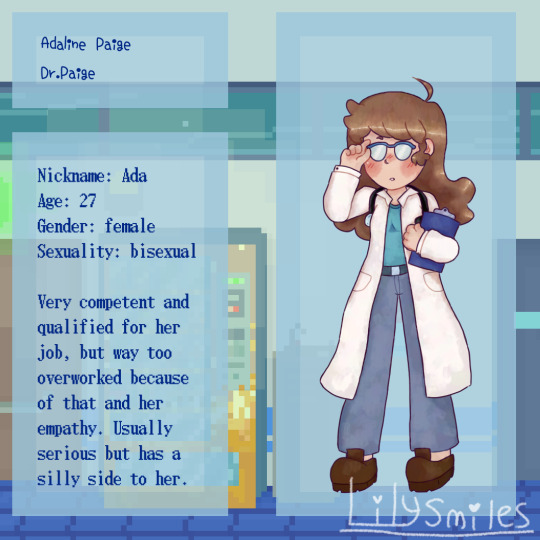
PAIGE MY BELOVED- we all know her <3 I like to think my interpretation is pretty similar to normal Paige . I love her very very much-
Next up is !:
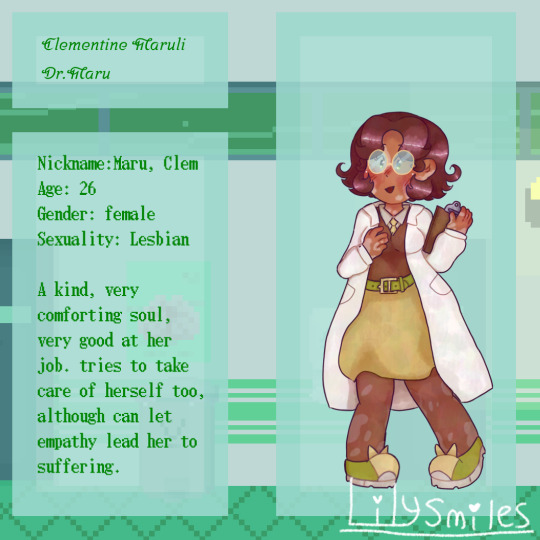
MARU! A beloved therapist at MiddleSea hospital ! She’s my main oc/self insert for rhythm doctor basically ^^’
Most of her is spoilers but what you do need to know is she cares about Paige a whole lot and just wants her to be happy :(
Hopefully this works and you guys enjoy them!!
#rhythm doctor#dr paige#ada paige#paige rhythm doctor#Clementine Maruli TempoTherapy#Maru TempoTherapy#I’m working on those tags for her#I hope everyone enjoys!#OCxCanon#TempoTherapyRhythmDoctorAU
11 notes
·
View notes
Text
Believe it or not, I simp for each person in the video.
Also i wanted to edit WW movies power couples for so long
#my edit#wonder woman#wonder woman 1984#wonder woman 2017#steve wonder woman#cheetah wonder woman#maxwell lord#dr poison#isabelle maru#general lunderdoff
11 notes
·
View notes
Text

Wonder Woman (2017)
#wonder woman#dceu#diana prince#steve trevor#hippolyta#antiope#ares#dr poison#isabel maru#etta candy
2 notes
·
View notes
Text
This anxious little doctor keeps popping back into my work doodles and sketchbook, and I am not disappointed.
The brainrot may have ceased, but he will always find a way.
Ft. Our favourite woman in STEM, Maru 💕


#stardew harvey#stardew valley#dr harvey#harvey stardew valley#sketch#stardew maru#stardew valley maru
36 notes
·
View notes
Text
On something that matters more
I’ve been hearing Juza’s VA in a few different series recently (I’m leaving his character song for voice reference)
youtube
youtube
youtube
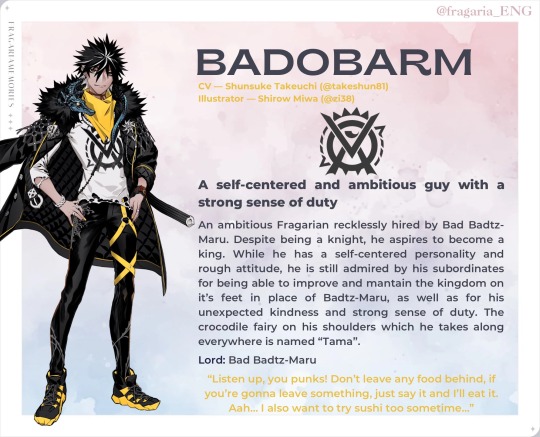
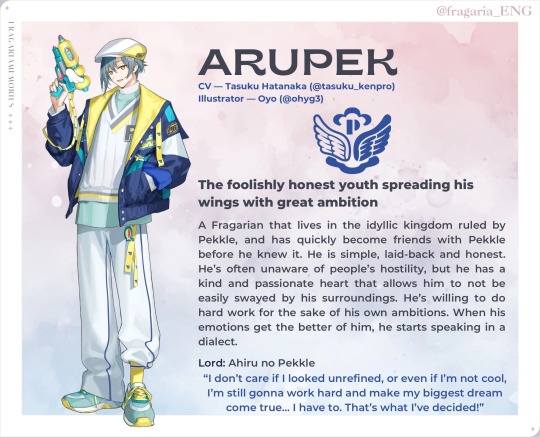
Bonus: Tasuku Hatanaka is in this series too so we have both Hyodo brothers together
#desiree talks#a3!#juza hyodo#shunsuke takeuchi#god damn he has a good voice#i already thought dr ratio was hot but ++ for the voice#anyway in the a3 x sanrio collab juza is paired with purin#but his VA voices the batz maru based character which was paired banri#jsyk lol#i’m also surprised the sanrio ikemen project has decent music#the character designs have a good variety and same with VA selection#the music isnt too bad either i would ded#*def download when given the chance to#Youtube
4 notes
·
View notes
Text
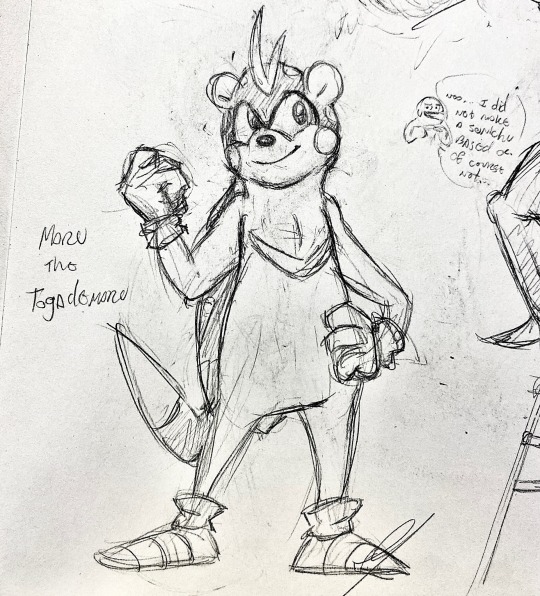
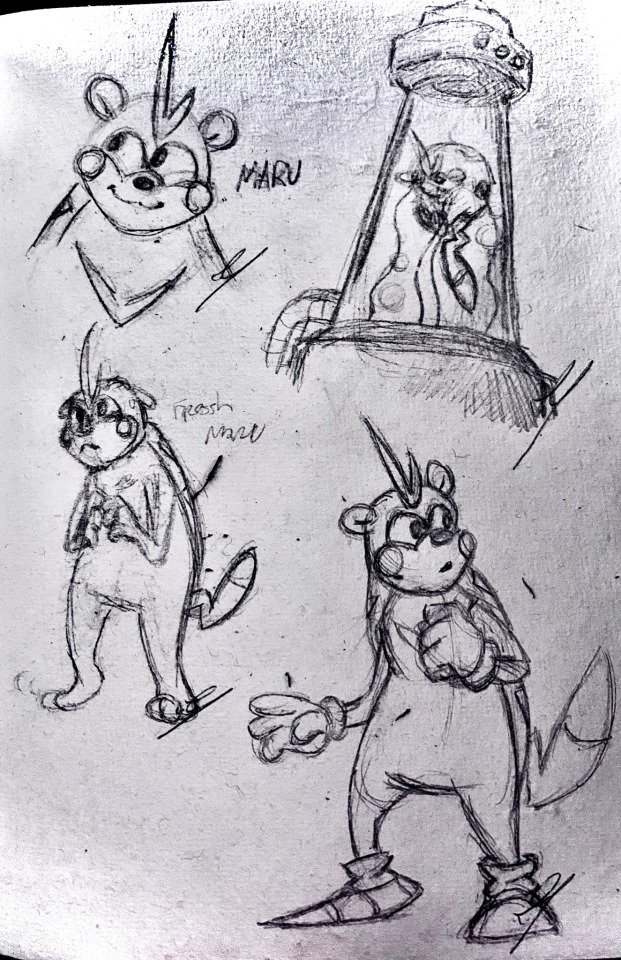
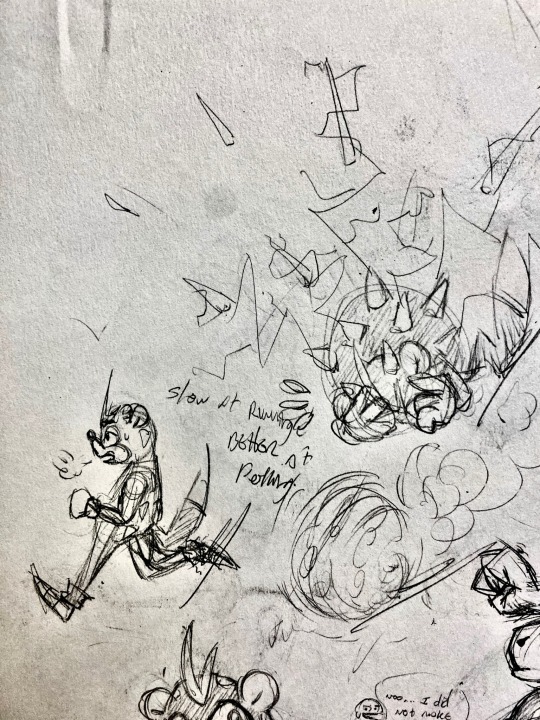
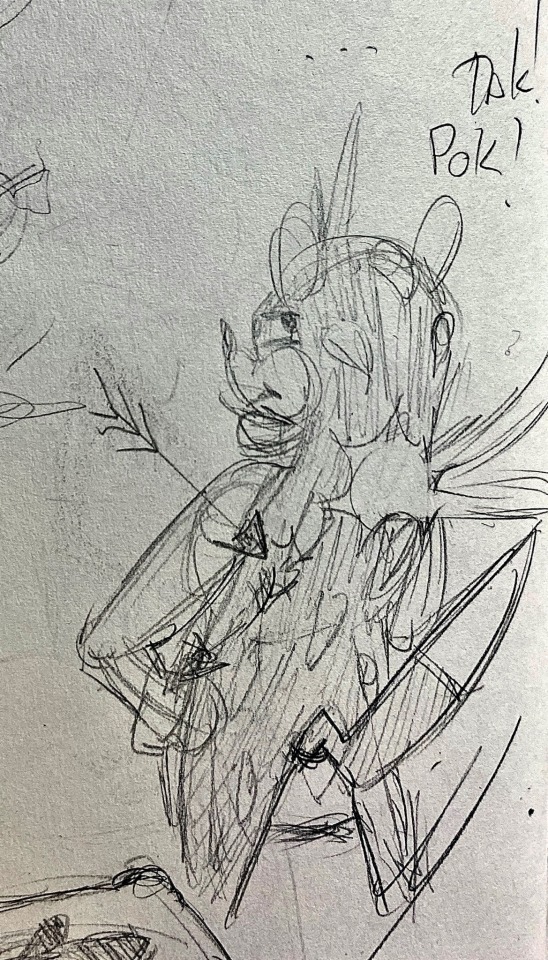
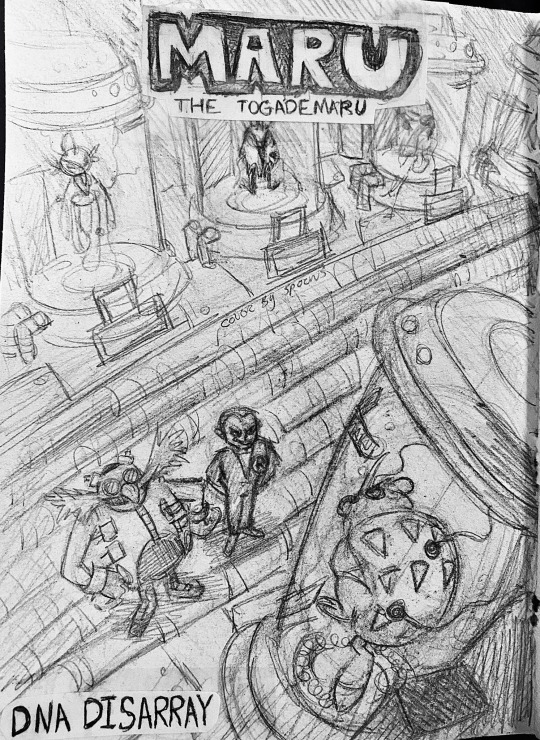
YouTube keeps throwing Sonichu at me, It has driven me to create >:|
This is Maru, a Pokémon/mobian hybrid created by Eggman and Giovanni in an attempt to mimic Sonic’s power and eventually take over the world. He is one of many.
I made a mock comic cover for fun. I’ve always enjoyed the characters of Sonic, not really the games/gameplay. I wanna read some of the comics at some point they look really interesting.
#my art#sonic#sonic oc#pokemon#togademaru#oc#character design#dr Eggman#giovanni#pokemon giovanni#team rocket#Sonichu mention#Sonichu#look at my funny little hedgehog boy#he is soft and kind#hehehe#anything to get me drawing things other than my senior film lmao#maru the togademaru#maru
6 notes
·
View notes
Text
📝🌸💖Hi everyone! I thought I’d share this excerpt from the chapter I uploaded today! Check it out, I promise it’ll be worth it!😉 Let’s get you wrapped up in this complicated romance brewing in my mind
🚩smut
Shane leans his weight on the hand he has placed above your shoulder, his arm held steady against the shifting of the sand. The air feels thick between your face and his as you both look on in silence. Every detail of him is so much more complicated in this proximity. Scruff in multicolored cool tones contours his jaw and chin. Pinkish lines rim his tired eyes that lead downward into deep purple and burgundy. The color of his under eyes tell of a restless night alone, or even that he had been crying previously in the day. Here in the dark, you try and slow time so you can stay here forever, memorizing every detail of him.
The slight rough texture of his fingertips awaken your skin as he traces a line across your jaw and chin, ending just below your bottom lip. Intensity fires in his eyes where they are looking above you. Shane slowly closes the distance between you, resting a delicate kiss on your lips. Together your lips rest gently, only moving enough to let the moment consume you. He is so gentle, being mindful not to touch you too roughly or increase the weight of him on you.
…
His head falls away from the seemingly endless kiss and rests beside your ear. Deep sounds of pleasure whisper through him as his hot breath tickles your neck. The noises he makes are nearly animalistic, responding to an instinctive need for you. The world feels as though it slips away in the moment of your touches. There isn’t a single person in the world other than him, the one who answers your need and holds you as though you are the only one he wants. Euphoric symphonies of sparkles shoot through your bones and encapsulate the sensations of him pressing against you.
#pierre stardew valley#stardew fanfic#stardew farmer#stardew harvey#stardew oc#stardew shane#stardew valley#stardrop#junimo#dr harvey#cozygamergirl#cozygamingcommunity#cozy games#nintendo switch#concerned ape#krobus#sebastian stardew valley#maru stardew valley#sdv fanfic#sdv shane#sdv fanart#sdv oc#sdv harvey#sdv farmer#sdv headcanons#sdv fandom#sdv sam#sdv emily#sdv abigail#sdv maru
2 notes
·
View notes
Text
I just watched Star Trek II: Wrath of Khan and wow that is also some gay shit
"I have been and always shall be yours" FUCK
Spock going in for the vulcan kiss through the glass and then Kirk hesitating and spreading out all his fingers instead. you would friendzone him while he's dying? diabolical
"of all the souls I have encountered in my travels, his was the most... human" what if I ate glass
I'm so glad I know that Spock comes back after this, because if I watched this in cinemas in 1982 and I had to live with this ending... I would be WEEPING. I would be in full mourning for 2 years
I just watched Star Trek: The Motion Picture and wow that really is some gay shit
I'd seen the "this simple feeling" scene, I was prepared for that. but I wasn't prepared for the full extent of the conversion therapy allegory
and then Spock saying "it knows only that it needs but like so many of us, it does not know what" while gazing at Kirk
and then the whole fucking resolution being that V'ger needs to discover something more, "a human quality, our capacity to leap beyond logic," through union with a human
it clearly parallels Spock and Kirk with V'ger and Will and directly implies that 'this simple feeling' is love, romantic love
WHAT THE FUCK I can only begin to understand what my fandom ancestors felt seeing this in 1979
#other general thoughts on the film:#the Moby Dick and Tale of Two Cities references! I love when they get a bit literary with it#the pacing is much better than the first one. and generally better writing but there were still a lot of plot holes I noticed like#why didn't The Reliant sensors detect Khan and his crew? how did Khan recognise Chekov when he literally wasn't there in 'space seed'?#how did khan and his crew take over The Reliant so quickly? how do they all know how to operate the ship?#the costumes are also better than the last one but that's a low bar. don't fix what aint broken. the TOS costumes are cunty and iconic#the differentiation of department and rank is really unclear and inconsistent and it's just plain boring#also I already knew the AOS movies were derivative but holy shit- Khan. Dr Carol Marcus. the kobayashi maru. Kirk and Spock vulcan kissing#or ~pressing their hands together~ through the glass. literally nothing original about those films#star trek#star trek ii: the wrath of khan#kirk/spock
183 notes
·
View notes
Text
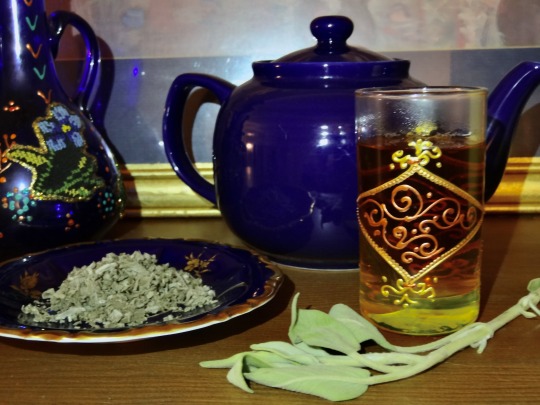
[ID: A Moroccan teaglass with a bundle of sage, a saucer of dried sage, a deep blue-purple teapot, and a Palestinian vase in the background. End ID]
شاي المريمية / Shay al-maryamiyya (Palestinian sage tea)
Palestinian sage is a common after-dinner beverage and digestive aid made from black tea and three-lobed wild sage (Salvia fruticosa syn. Salvia triloba L.). In the Levant, this variety of sage is known as "مَرْيَمِيَّة" ("maryamīyya") or, more dialectically, "مَرْمَرِيَّة" ("marmariyya").
Terminology and etymology
The term "maryamīyya" likely derives from the Aramaic "מרייא" ("marvā"), meaning "common sage" (Salvia officinalis). The modern form of the word in Arabic—as well as in Persian, in which "مریم گلی" ("maryam goli") is “sage” or "garden sage"—was also influenced by a folkloric association between sage and the مَرْيَم (Maryam) of the Bible (Mary, mother of Jesus). Dr. Tawfiq Kanaan, for example, says that Mary sat on a stone to rest after a walk in the hot summer sun, and used a few leaves from a sage plant to dry her forehead: this is how the plant got its pleasant scent, and why it is still named after Mary. The dialectical pronunciation "marmariyya" then arises through an assimilation of the second syllable to the first.
"Maryamīyya" is perhaps also related to the obsolete Arabic مَرْو ("marw"), meaning "fragrant herbs" [1]. This Arabic term is derived from the Aramaic מַרְוָא / ܡܲܪܘܵܐ ("marwā"), which refers to wild marjoram or za'tar (Origanum syriacum; syn. Origanum maru) and is related to words for fragrant herbage, marjoram, and grass (Ciancaglini; see also Aramäische Pflanzennamen, p. 193). The Aramaic is itself a borrowing from the southwest Middle Persian "𐭬𐭫𐭥𐭠" (transliterated: mlw'; pronounced /marw/) [2], which survives in several New Persian words: see for example "مرغ" ("margh"), "a species of grass of which animals are exceedingly fond"; and "مرو" ("marv"), "a fragrant herb." (Interestingly, the related Sanskrit मरुव "maruva" ultimately gives the English "marjoram" by way of Latin and Old French.)
[1] The term may also refer to the genus Maerua (to which it gives its name), and in particular the species Maerua crassifolia.
[2] See also Müller-Kessler, p. 10, and note 41 on p. 29; MacKenzie, p. 55.
Sage and Palestinian Culture
Three-lobed sage is one of the "most deeply rooted plants in the Palestinian traditional culture and ethnobotany," being the second-most-mentioned of all foraged plants (after za'tar) in a survey conducted in 2008. The connection of three-lobed sage to Maryam leads to its use in creating protective blessings at various rituals from birth until death; in the Galilee, it is burned to guard against the evil eye and to expel demons at births, weddings, and at the graves of holy people. When consumed, it is believed to help with many ailments including stomach complaints, eye diseases, and insomnia, and is used to treat livestock as well as humans.
Maryamiyya is not commonly grown as a garden herb in Palestine; rather, it is foraged from its wild range across the mountains of the West Bank, where it scents the air. Like za'atar and labna, using maryamiyya for culinary purposes is connected to Palestinian identity throughout all regions, with some people asserting that every Palestinian household must have some in stock.
Tea made with the addition of sage is perhaps the most popular herbal tea in Palestine, especially in the winter: though mint, chamomile, and aniseed are also commonly infused in water and drunk. Other varieties of sage grow in Palestine and are produced and exported by Palestinian farmers [1], but Gustaf Dalman noted in the early 20th century that three-lobed sage was the most important variety:
Of the spicy-smelling labiate flowers, which assume a significant role in the flora of Palestine, numerous sage varieties bloom in the spring. Among these the Salvia triloba, with violet flower heads on a tall shrub, is not the most colorful but is the best known, called in the north 'ēzaqān [عِيزَقَانْ] and in the south miryamīye, mēramīye thus connecting it with the Virgin Mary. (trans. Nadia Abdulhadi Sukhtian)
During the spring, sage leaves are collected and air-dried for use in tea throughout the whole year. Tea may also be made from fresh leaves, but some people consider dried to be superior. Dried maryamiyya leaves are purchased by Palestinian refugees and expatriates wherever they are. Food is thus tied to locality, memory, resistance, and terroir—a groundedness in land that considers aspects as diverse and interconnected as soil, climate, and politics. A concept of terroir in agriculture and cooking brings out how products "register[] origin and provenance."
[1] Today, the vast majority of Palestinian herb exports are to the United States, but Palestinian farmers are not able to export goods themselves—they rely on Israeli distributors and exporters, which cuts into their profits and curtails their autonomy.
Criminalizing Foraging
Ali-Shtayeh et al. noted in 2008 that the gathering of wild edible plants had been in decline in the Palestinian territories throughout preceding decades, with many young people lacking the cultural knowledge to identify and prepare wild plants. They mention several possible reasons for the decline, including an increase in intensive agriculture, improvement in national networks of roads, and the fact that some middle-aged people associate foraging with times of poverty. But we should also consider the fines, arrests, and potential imprisonment that Palestinians risk when foraging wild plants for food as a likely cause for the decline in the practice.
There are two strains of law relevant to the criminalization of foraging in "Israel" and the occupied Palestinian territories (the West Bank and Gaza: henceforth "OPT"). The first consists of primary laws which establish the right of representatives of the Israeli government to declare a plant to be a protected "natural value" (ערכי טבע), and lay out the maximum penalties people can be charged with for causing "harm" ("פג'עה") to a protected plant; the second comprises secondary declarations in the form of lists of which plants are considered protected.
The 1963 Natural Parks and Nature Reserve Law (חוק גנים לאומיים ושמורות טבע, תשכ"ג - 1963) belongs to the first strain. It empowered the Minister of Agriculture to declare a plant to be protected within "Israel," subject to the approval of a government council (ch. 5, 40-42); and declared that harming a plant was an offence punishable by up to three months' imprisonment (chapter 6).
In the text of the law, "harm" is specifically defined to include "picking," "קטיפה," and "gathering," "נטילה." No systematic distinction is established based on how much of the plant was harvested, and whether the plant was foraged for personal or commercial purposes. Nor is there any qualification of what qualities a plant should have to be considered "protected," or any obligation for the government to pursue or present scientific evidence that a given plant is overharvested.
In 1969, The Decree on the Protection of Nature (צו בדבר הגנה על הטבע) (Military Order no. 363) gave similar authority to the occupying military, and criminalized foraging in the OPT. Military orders are enforced by military courts, whereas offenders in "Israel" go through civil courts.
Several plants were already on the list of protected natural values at this time, but they were not commonly foraged for food. 1977 proved a signal year in this regard: with the "Proclamation of National Parks and Nature Reserves" [אכרזת גנים לאומיים ושמורות טבע (ערבי טבע י מוגנים), תשל״ח -1977], Minister of Agriculture Ariel Sharon (אריאל שרון) added za’tar ("אזוב מצוי") and maryamiyya ("מרוה משולשת") to the list. The inclusion of these plants, and especially za'tar, was more disastrous and insulting than previous bans on foraging had been. Za'tar, besides being a source of food and income for many poor or disabled Palestinians, has immense cultural significance in Palestine.
Arab Palestinians—and only Arabs—were arrested, fined, and even imprisoned, with no clear correspondence between the amount they had foraged and their sentencing. Most of the recorded court cases in "Israel" deal with za'tar, though court cases in legal databases show that Palestinians were also fined and tried for foraging maryamiyya (FN 38). An atmosphere of intimidation prevailed, with many habitual foragers feeling newly afraid to leave their homes.
In 1998, a new National Parks, Natural Reserves, National Sites and Memorial Sites Law [חוק גנים לאומיים, שמורות טבע, אתרים לאומיים ואתרי הנצחה, תשנ"ח-1998] replaced the prior National Parks law (of 1992, which had itself replaced the aforementioned 1963 law). It removed the necessity for an ecological council to approve the Minister's declaration of a "protected" status, and increaed the maximum prison time for a violation of the law to three years. Throughout all periods, however, the penalty usually imposed has been a fine.
Since the imposition of the harsher law, two notable updates have been made to the list of protected plants: the 2005 list of Protected Natural Assets) [אכרזת גנים לאומיים, שמורות טבע, אתרים לאומיים ואתרי הנצחה (ערכי טבע מוגנים), התשס״ה–2005] replaced the 1979 list, and added عَكُوب ('akoub; "עכובית הגלגל"), a culturally important and commonly foraged thistle. [1] Za'tar and maryamiyya remained on the list. The 2005 declaration also specifies that the species on the list are protected if they are wild, but not if they are cultivated (section 3). This provision allows Israeli farmers to profit from the farming and sale of za'tar.
The second notable update came in 2019: the Nature and Parks Authority (שרשות הטבע והגנים) announced that it would redact the absolute ban on harvesting za'tar, maramiyya, and 'akoub, instead setting a maximum allowable amount for household consumption and cracking down on the sale of these plants, rather than on foraging itself.
Activists believe this partial measure to have occurred as a result of legal and public pressure instigated by an open letter which human rights lawyer Rabea Eghbariah sent the Israeli Attorney General and Environmental Protection Minister requesting that za'tar, 'akkoub, and maryamiyya be removed from the "protected" list in advance of their foraging seasons, noting the inconsistency in sentencing and the law's disproportionate criminalization of Palestinians. (The specific cultural importance of these three plants is attested by the fact that they, among the dozens of species considered "protected," form the basis of Eghbariah's complaint.) The Nature and Parks Authority (NPA), however, insisted that an independent assessment, and not public criticism, had led them to announce the change in policy. And fines levied at Palestinian foragers did continue despite the announced change in policy, at least through March 2020.
Nor is the change complete in scope, even if it were being upheld. Eghbariah notes that "It is not yet clear if the change will also apply [in the West Bank] - and there it is a parallel system, less transparent and much more predatory. The enforcement is much worse, including the confiscation of cars, and the judgment is in a military court. We will continue to monitor."
[1] Eghbariah writes that the "Protected Natural Values Declaration (Amendment No. 2) (Judea and Samaria), 1978" added za'tar and maramiyya to the list in the OPT, and the "Protected Natural Values Declaration (Amendment No. 2) (Judea and Samaria), 2004" added 'akoub. I have been unable to find or independently verify the text of either declaration. From a list of secondary legislation related to military orders, I believe the declaration being amended is "הכרזה בדבר ערכי טבע מוגנים (יהודה והשומרון), התשל"ג - 1973".
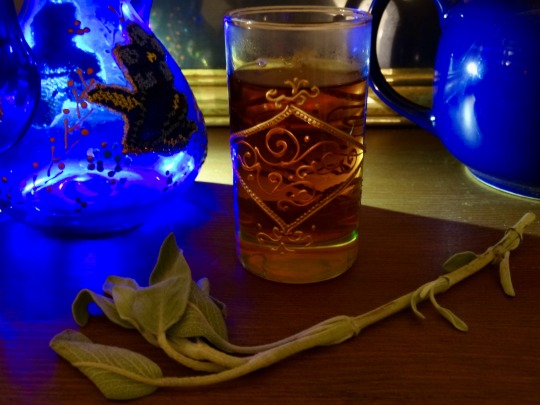
[ID: Light shone through a blue glass vase is cast over the bundle of sage and glass of tea. End ID]
"Preservation" and Green Colonialism
Of course, Palestinians and activists also suspect that the underlying purpose of the ban is to starve and intimidate Palestinians, rather than any real concern with nature. Israeli botanist Nativ Dudai points out that foraging causes much less harm to these plants than Israeli bulldozers do. Samir Naamneh, who sells foraged produce, also dismisses the environmentalist excuse for the ban on foraging:
We feel, and we know, and we’re sure, that the laws are made, on principle, against the Arab residents of the country, to hurt their livelihoods. It’s part of the pressure that Israel puts on us to starve us out.
The 1977 decision to add za'tar and maryamiyya to the protected plants list was ostensibly taken in accordance with a report submitted by a group of Israeli ecologists, which suggested that the species were in danger due to over-foraging. However, Israeli forager Yatir Sade (יתיר שדה) suggests that the converse may be true, and that the people who wrote the report might have taken their cues from the government.
On June 20, 1977, the inauguration of the Begin (בגין) Cabinet marked the first time that a right-wing party had held a majority in the Knesset; this dramatic change in Israeli politics would come to be called "המהפך" ("HaMahapakh"), "the revolution" or "the upheaval."
Sade's research reveals that, about a week later, on June 27, 1977, a team of ecologists at the NPA submitted a list of species to the Legal Bureau at the Ministry of Agriculture (משרד החקלאות), suggesting that they be declared protected. The list is accompanied by a letter of legal advice signed by a partner in the law firm Reva, Shein, Katz & Co. This initial suggested list did not include four species which would end up on the final 1977 list, all of them important culinary and medicinal herbs among Palestinians and Bedouin Arabs: babonj (בבונג / بابونج / golden chamomile), maryamiyya, za'tar, and ss'atr barriyy (صعتر بري / קורנית מקורקפת / Persian hyssop). [1]
But about four months later, on October 16, another letter was sent on behalf of the same law firm, requesting that these four species be added to the "protected" list, and that the standard procedure for adding them be expedited. Accordingly, on November 2, only a few days after receiving the letter, the Minister's office published the final declaration, with golden chamomile, maryamiyya, za'tar, and Persian hyssop newly added. The new Minister of Agriculture Ariel Sharon (אריאל שרון), part of the First Begin Cabinet and co-founder, with Menachem Begin, of the right-wing party HaLikud (הליכוד), signed the new declaration. It therefore seems likely that these plants were added to the list for political reasons and precisely because of their importance to Palestinian Arabs, rather than from any ecological concern.
It is also relevant that the 1963 and 1998 laws which criminalized foraging also laid out guidelines for the creation of national parks, nature reserves, and military and state memorial land. The text of the 1998 law, in particular, describes the goals behind creating these sites, and gives the council it establishes the authority to do anything necessary to promote those goals. These goals include to "protect natural and heritage sites" ("הגן על ערכי הטבע והמורשת"); to "maintain international scientific relations" in the field of nature conservation ("קיים קשרים מדעיים בין-לאומיים") ; to promote education about conservation among youth and students (7. (א)); and to promote travel and tourism (14. (א)).
Many discourses and strategies can here be seen operating together. The creation of nature reserves, state heritage sites, and military memorial land all within the text of the same law explicitly connects environmentalism to patriotism; creates special reasons for bringing land under state control, and imposing special codes of behavior on this land (i.e., natural and heritage sites); connects environmentalism to state ownership and control of land, and connects both to the education of youth and the creation of the ideal Israeli civic subject; uses environmentalism to promote Israel internationally as a scientific authority, a responsible steward of land (unlike the indigenous population), and thus a legitimate state; and sanitizes and 'advertizes' Israel internationally by associating sites of destruction, annexation, and ethnic cleansing with the concepts of environmental protection, natural beauty, preservation, and heritage.
Israel frequently declares land a "nature reserve" as a method of annexation, only to later build settlements on it (see Karimi-Schmidt p. 369 ff). Palestinians are forbidden from foraging certain plants within nature reserves (other plants are forbidden for foraging everywhere), and from constructing on them; they are thus alienated from this land, and dissociated from the ways in which they have long related to it. Yatir Sade points out that the four plants added to the original 1977 draft of the protected species list are typically harvested out in open areas, rather than within yards and villages; declaring these areas nature reserves, or arresting Arabs who enter them under suspicion of foraging, prevents Palestinians from moving freely, and from claiming any connection to the land. [3]
The "Green Patrol" (HaSayeret HaYeruka / הסיירת הירוקה), the enforcement unit for the NPA, was founded in 1976 by then-Minister of Agriculture Aharon Ozan and director of the Israel Land Administration Meir Zore, for the specific purpose of policing "open areas" (שטחים פתוחים) which had been declared state land, and preventing Palestinians from "tresspassing" ("הסגות גבול") or illegally building in these areas. [4] Through these strategies, land is appropriated for the state's and settlers' purposes under the guise of environmentalism.
In much the same way, the list of protected species is ultimately about using environmental science to cement state authority. Irus Braverman points out that endangered species lists function as a means of regulation, not least by being ostensibly objective: "their global power, mobility, and ubiquity derive from their configuration as scientific, technical, and quantitative, and therefore as neutral and apolitical." The protected species list thus joins other "environmental infrastructures," such as renewable energy and agricultural technologies, as a "mechanism[] for land appropriation and dispossession" of the indigenous population: together, these infrastructures make up a strategy that is alternately called greenwashing, green grabbing, and green colonialism.
[1] Letter regarding the declaration of national parks and nature reserves (protected natural values), 1977, from Ofir Katz to Tovi R. [מכתב בנושא אכרזת גנים לאומיים ושמורות טבע (ערכי טבע מוגנים) תשל"ז-1977, מאופיר כץ לטובי ר'], 6/27/1977. In: Proclamation of National Parks and Nature Reserves (Protected Natural Values), Ministry of Agriculture and Rural Development [אכרזת גנים לאומיים ושמורות טבע (ערכי טבע מוגנים), משרד החקלאות ופיתוח הכפר], January 1965–October 1982. State Archives, ISA-moag-moag-00119qy, pp. 164-175.
[2] Letter regarding a proposal to declare national parks and nature reserves (protected natural values), 1977, from Ofir Katz to Tovi R., [מכתב בנושא הצעה לאכרזת גנים לאומיים ושמורות טבע (ערכי טבע מוגנים) תשל"ז-1977] 10/24/1977. In: Proclamation of National Parks and Nature Reserves (Protected Natural Values), Ministry of Agriculture and Rural Development, January 1965–October 1982. State Archives, ISA-moag-moag-00119qy, p. 160.
[3] Yatir Sade, Master's thesis, pp. 68-9. Personal communication.
[4] Sade points out that Yehuda Reva (יהודה רווה), another partner of the law firm that provided legal advice on the matter of the 1977 protected species list, was also prominent in helping the Green Patrol expropriate Palestinian land and property within the bounds of Israeli law (Master's thesis, p. 44, FN 34).
Foraging and Food Sovereignty
The disastrous effect of these strategies and regulations should not be understated—but nor should their power to control Palestinians' behavior be overstated. Palestinians reference specific plants in writing and in art (including ceramics and tatreez), bring dried herbs to family members abroad, purchase or grow important culinary plants wherever they live in the diaspora, and continue to forage plants despite harassment and the risk of fines and arrest. Plants are an important way of symbolizing, and of practicing, resistance, resilience, and rootedness in history and in the land.
Foraging can be a strategy of reconnection in defiance of dispossession. Rochelle Davis notes that Palestinians often visit the villages from which they were displaced in order to gather grape leaves and herbs, “ingesting the place by consuming the land’s produce” (p. 172). Through this practice, as Anne Meneley puts it, "[e]ating becomes an act of momentary repossession."
The message boards on PalestineRemembered.com attest to this practice. When Mouttaz Ammoura returned to الطيرة (Al-Tira), the village from which his family was displaced, he noted maramiyya as the one plant he brought back with him:
Now I live in Canada, but far-away from AL-TIRA. When I came back, I brought with me some sand, maramieh, few stones, & water from Tirat Haifa. Yes, I brought all of that to remember al-Tira & to have it close to my hart back in Canada.
In an interview conducted in a Palestinian refugee camp in 1998, women demonstrate this same association of plant life with place:
They spoke of the names of land plots around ~ Tjzim (Wadi al-Nahel, Durat al-Qamar, Shana), and the act of naming evoked an aura of magic for those who remembered the places [...]. They also related to the wild plants. The women, who felt we had shifted to familiar ground, called out the names — khubeize (mallow), ‘aqub (tumble thistle), maramiyyeh (sage), za’atar (thyme).
Mirna Bamieh's Palestine Hosting Society put on an Edible Wild Plants Table, which registered the connection of foraging to place, local knowledge, and temporality. The project, which focused on "identifying the names, forms, locations and availability of wild plants in Palestine’s nature," involved a menu created from foraging in the mountainous regions of Palestine during the blooming season "from mid-January until the end of February."
Foraging is also one strategy among many that Palestinians use—alongside instituting agricultural innovations, creating native seed banks, educating about Palestinian cuisine, and seeking out contracts with foreign markets—to attain food self-sufficiency and sovereignty. It is therefore both a symbolically defiant strategy, and a practical one. Palestinians illustrate a belief in the illegitimacy of Israel's laws and claims, and insist on the primacy of their relationship to the land, when they forage for food.
When asked whether he believed that 2020 would bring the promised relaxation in criminalization of foragers, Samir Naamneh, who has been repeatedly fined, arrested, and tried over the past decades, told Dror Foyer (דרור פויר):
"We'll live and see, but it won't change anything for me: whether it's allowed or not, I'm going to forage. I do the work I love, and I'm at peace with myself. The fact that I'm making a statement to the State of Israel and their law—that's enough for me."
Donate to an evacuation fund
Donate eSims
Palestinian heirloom seeds
Ingredients:
250g filtered water
2.5g (1 1/2 tsp) high-quality loose leaf black tea
4g (1 1/2 Tbsp) dried three-lobed sage, or substitute another variety of sage
Sugar, to taste (optional)
Dried three-lobed sage can be purchased from a Palestinian brand such as Al-'Ard or Yaffa (not "Jaffa").
Instructions:
1. Combine tea with just-boiled water and steep for two minutes.
2. Add sage and steep for another minute.
3. Pour into tea glasses and serve hot.
Times and quantities are geared towards producing a tea that is mild enough to be enjoyed without sugar. Adjust as per preference.
371 notes
·
View notes
Note
Begging for your opinions on Harvey
I like him!!
I think it's cute to see him has the older brother figure Maru wishes she had
I also think it's hilarious that he and the other older bachelors just get kinda roasted by that one secret note. If i found an anonymous note that described me as "really anxious and weak" i would have probably left town
His "are you sure this is healthy :/ :/ :/" comments annoy me. which IRL would suck but i actually love when fictional characters are irritating (it's a plus in my book, it's just fun)
Him referring to himself as "Dr. H" on the radio is so endearing. That and Sam calling him Uncle Doctor
Him doing dance aerobics sessions with the ladies is so cute. It's honestly really funny to me that he's desperate to keep it a secret and yet he's attending with who i am pretty sure are the town's biggest gossips
#ask#anonymous#that said#personally he's not my choice for marriage#don't fuck med students current or former that's all i'm gonna say#sdv harvey
161 notes
·
View notes